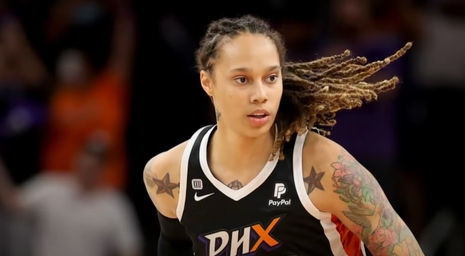 When Moscow airport screening officials discovered vape cartridges filled with cannabis oil in Brittney Griner’s luggage in February, they detained her. Now the 6-foot-9-inch WNBA player is looking at 10 years in a Russian prison for “large-scale transportation of drugs.” Not entirely her fault though, because Insider sports blog attributes her presence in Russia to a so-called gender pay gap in the United States.
When Moscow airport screening officials discovered vape cartridges filled with cannabis oil in Brittney Griner’s luggage in February, they detained her. Now the 6-foot-9-inch WNBA player is looking at 10 years in a Russian prison for “large-scale transportation of drugs.” Not entirely her fault though, because Insider sports blog attributes her presence in Russia to a so-called gender pay gap in the United States.
Griner, who plays for the Phoenix Mercury in the U.S., was in Russia while playing basketball for the UMMC Ekaterinburg team there.
Meredith Cash, the Insider writer covering the story, is quick to excuse Griner’s drug indiscretions. This “horrifying situation has shaken the American sports landscape to its core, but ironically, the circumstances that led to Griner's arrest could have been avoided entirely had the American market placed a higher value on her talent. The legendary hooper was only in Russia to supplement her income.:
Like many other women's basketball players, Griner spends her WNBA offseason competing overseas. Since 2014, she's suited up for Russian powerhouse UMMC Ekaterinburg alongside a rotating group of fellow WNBA superstars.”
Cash says players like Griner can make much more money playing overseas than in the WNBA, with its league maximum salary of $227,900. That’s not exactly chump change, but it certainly deflates the merits of the Insider sob story. In fact, Griner’s WNBA pay is nearly five times the average U.S. salary. She also earns $1 million from Ekaterina, pushing her total salary to 25 times the average U.S. salary.
Long story short, Griner is loaded, she doesn’t need two jobs and Cash’s story is a joke. Griner is one of 11 players who has won championships in the WNBA, NCAA, the Olympics and the EuroLeague. She is paid exceedingly well for exhibiting that resume.
Nevertheless, the Insider story is a succession of rationalizations in defense of an American who stupidly tried to pass through an airport with drugs.
Cash claims that having to play two basketball seasons each year is wearing Griner down physically. Griner’s million-dollar basketball career is far from ideal and she doesn’t get enough rest. The wear and tear of her roundball career leads to nagging injuries that can shorten a player’s career (but not her savings account). It’s Griner’s choice, not a necessity, to play two seasons.
Adding to her beef, Cash suggests the Russian war on Ukraine might just make Griner’s situation more perilous. The basketball star could be used as a pawn “in a fiery feud between two global superpowers.” Cash got this idea from the New York Times.
According to The New York Times, Russia might use Griner "to create leverage for a potential prisoner exchange with the American government or a reduction in sanctions related to the [Ukraine] invasion." The Times' Jonathan Abrams also writes that "Russia has been detaining and sentencing American citizens on what United States officials often say are trumped-up charges." That doesn’t even remotely apply here, what with Griner’s drug-laden luggage.
Cash also applies the current geopolitical feud to the unfortunate pay disparity victimizing the poor, hapless Griner, when the WNBA giantess can only be marginalized when compared to males earning mega-millions in the NBA.
“Had she made even a fraction of what her NBA counterparts do while playing domestically, Griner could have stayed in the United States for the offseason without fear that she wouldn't have enough money for retirement,” Cash whined. “She could have rested her 6-foot-9 frame ahead of this summer's WNBA season, as her reloaded Mercury squad sets its sights on a second straight WNBA Finals appearance, and she could have spent time back home with friends and loved ones.”
Thus, Griner could have avoided jail time in a “hostile foreign power” if only she was on the same pay scale as LeBron Jame$. That’s never going to happen because the WNBA is nowhere close to the marketability and the revenue of a major male sports league.






